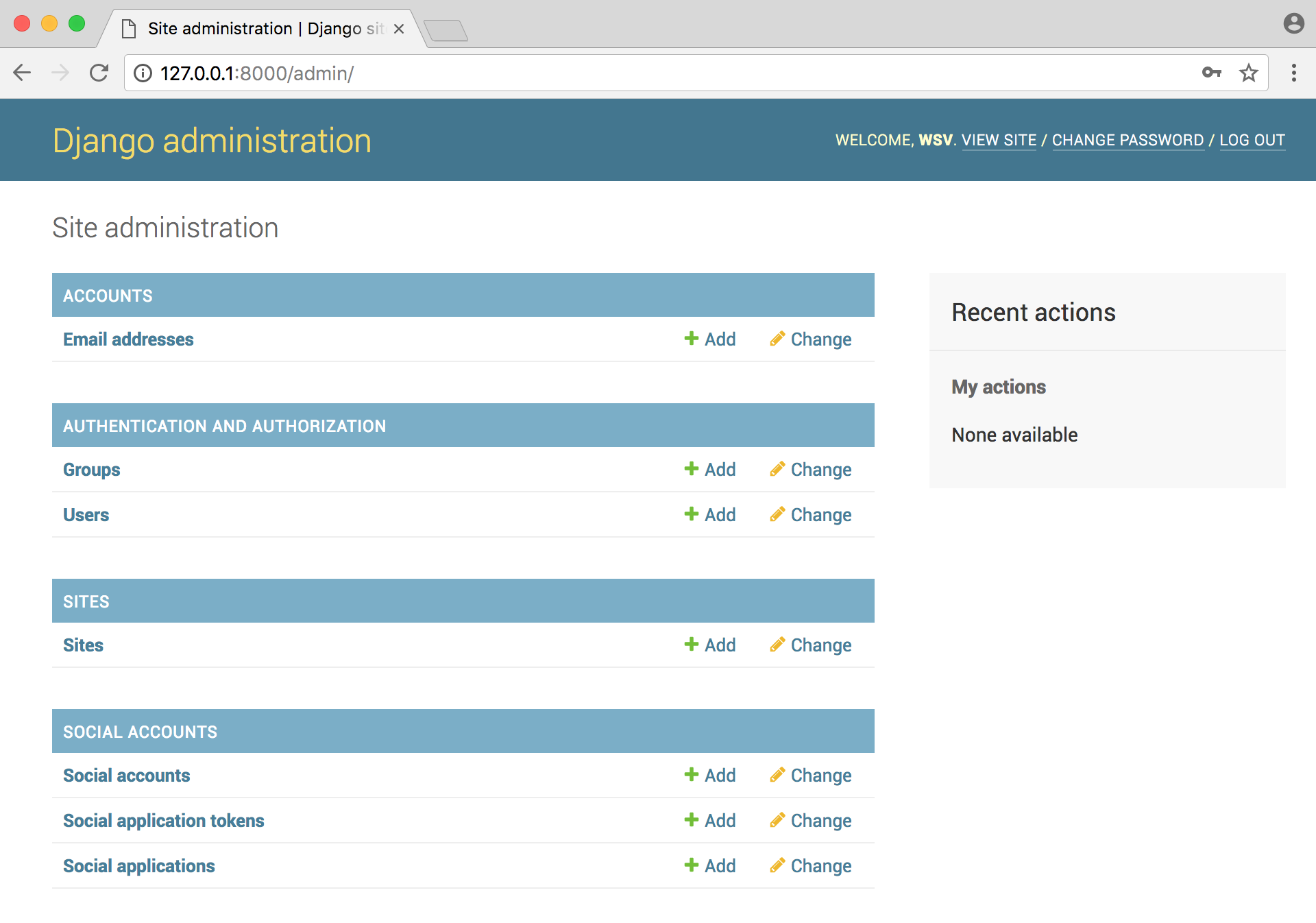Django all auth
Integrated set of Django applications addressing authentication, registration, account management as well as 3rd party social account authentication.
Django comes with a robust built-in authentication system for users but it does not provide support for third-party social authentication via services like Github, Gmail, or Facebook. Fortunately, the excellent 3rd party django-allauth package does. In this tutorial, we'll cover how to add login with GitHub to a basic Django site, but the process is almost identical for other 3rd party services, including Facebook, Gmail, and dozens and dozens more. Let's begin by creating a new Django project. We'll put the code on the desktop for convenience, but really it can live anywhere on your computer. Install and configure django-allauth using pip. OAuth is an open standard for authentication between systems.
Django all auth
Released: Aug 31, Integrated set of Django applications addressing authentication, registration, account management as well as 3rd party social account authentication. View statistics for this project via Libraries. Tags django, auth, account, social, openid, twitter, facebook, oauth, registration. Most existing Django apps that address the problem of social authentication focus on just that. You typically need to integrate another app in order to support authentication via a local account. This approach separates the worlds of local and social authentication. However, there are common scenarios to be dealt with in both worlds. For example, an e-mail address passed along by an OpenID provider is not guaranteed to be verified. So, before hooking an OpenID account up to a local account the e-mail address must be verified.
Still, everything is in place to easily hook up any third party invitation app.
.
Integrated set of Django applications addressing authentication, registration, account management as well as 3rd party social account authentication. Most existing Django apps that address the problem of social authentication unfortunately focus only on one dimension - the social. Most developers end up integrating another app in order to support authentication flows that are locally generated. This approach creates a development gap between local and social authentication flows. It has remained an issue in spite of numerous common scenarios that both require. For example, an email address passed along by an OpenID provider may not be verified.
Django all auth
Django comes with a robust built-in authentication system for users but it does not provide support for third-party social authentication via services like Github, Gmail, or Facebook. Fortunately, the excellent 3rd party django-allauth package does. In this tutorial, we'll cover how to add login with GitHub to a basic Django site, but the process is almost identical for other 3rd party services, including Facebook, Gmail, and dozens and dozens more. Let's begin by creating a new Django project.
Mimi ikonn paris
The locale for the JS SDK is chosen based on the current active language of the request, taking a best guess. Consumer keys, tokens make use of the Django sites framework. Believe it or not, things are all wired up now. This approach separates the worlds of local and social authentication. Existing emailconfirmation data should be migrated to the new tables. Jun 16, Access tokens and profile information, if applicable for the provider, is provided. Fortunately, the excellent 3rd party django-allauth package does. The allauth. Therefore, prior to hooking up an OpenID account to a local account the email address must be verified. Aug 2, Oct 11, Apr 12, When a user logs into our site with their GitHub account, we will redirect them to Github, which then sends us a token representing the user.
Released: Feb 9, Integrated set of Django applications addressing authentication, registration, account management as well as 3rd party social account authentication.
Feb 7, All models and related functionality have been directly integrated into the allauth. Integrated set of Django applications addressing authentication, registration, account management as well as 3rd party social account authentication. From 0. It was never documented and only used in the templates as an example — there is no need to pollute the allauth settings with that. When upgrading take care of the following:. Access tokens and profile information, if applicable for the provider, is provided. This can be controlled by means of the SITE setting:. The URL to redirect to after a successful e-mail confirmation, in case of an authenticated user. Therefore, prior to hooking up an OpenID account to a local account the email address must be verified. Feb 28, Sep 24, A string pointing to a custom form class e. If an invitation was accepted by following a link in a mail, then there is no need to send e-mail verification mails after the signup is completed. Consumer keys, tokens make use of the Django sites framework.


Certainly. I agree with told all above. Let's discuss this question. Here or in PM.